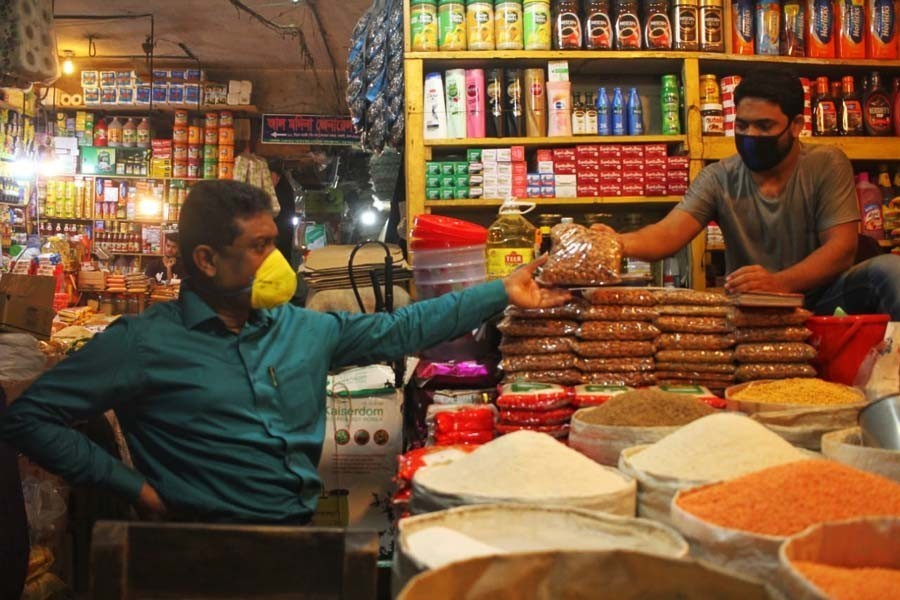Continual hike of prices of essentials and many other commodities has hit the low and limited income people hard. This group of people represents majority of the population that is now struggling hard for survival in the post-pandemic time. During the pandemic, these people suffered most as they had lost their jobs and faced salary and wage reduction. So the current wave of unchecked price hike has made them most vulnerable. Their cost of living has increased significantly due to price hike of food and non-food commodities and services including transport and housing.
So what drives the price of essentials and ultimately the inflation? There are many explanations. Economists see the mismatch of supply and demand while businessmen and traders claim the rise in the cost of imports from abroad. People who are suffering blame the unscrupulous nexus of traders and indifferent attitude of the authorities for the uncontrolled price hike of essentials. Ministers argue that price hike is less compared to the rise in income of the people. Some of them opine that it is a global phenomenon while some sense conspiracy of the opposition political party behind the price hike. The Russia-Ukranie war becomes the latest factor in this connection.
Whatever the real reasons are, unbearable suffering of a large number of people due to the unbridled price hike is a harsh reality in Bangladesh now. It is now leading to a deep crisis. The government has also acknowledged the fact which is reflected in its decision to provide subsidised food to 10 million poor households across the country through the Trading Corporation of Bangladesh (TCB) on the eve of holy month Ramadan. This kind of intervention may bring some temporary relief for the consumer, although it will not address the problem of unchecked price hike effectively. To deal with the price-related problem, a number of factors are necessary to understand and review.
The supply of food items and essentials in Bangladesh are largely sourced through import from abroad. Though the country produces enough rice, there is surge of import in recent years. In the last fiscal year (FY1), imports of rice and wheat increased by 50 per cent and 36 per cent over the previous years in value terms. Again, during the first nine months of the current fiscal year (FY22), rice import surged by 21 per cent while import of wheat declined by 44 per cent. Though one-third of the imported rice was shipped by the private traders, wheat import is entirely dependent on them. Again, consumer items like milk, spices, edible oil, pulses, sugar, onion and others are all imported by the private sector where the government has almost no presence. Even the products for TCB are also imported through private traders and dealers.
Now the imports of essentials are largely controlled by a number of big trading houses. There is always an allegation that these big traders create unholy nexus among themselves to determine the supply and prices of these goods. They are also blamed for not allowing other small traders to enter in the market to import and supply the goods. Reality is that these big traders have gained economies of scale over the years due to their size and efficiency. They have a wide network in abroad for import and at home to supply the products. So, they can easily manoeuvre and manipulate the supply chain of these items from import stage to retail market thorough wholesale traders. And sometimes, the big importers unfairly use their market power to engage in profiteering which makes the wholesale and retail markets pricey.
At the same time, rent-seekers are active in the domestic market and they are also responsible for unchecked price hike. It is an open secret that a section of dishonest political leaders and activists along with some members of law enforcing agencies are involved in illegal toll collection at various stages of the supply chain. For instance, illegal tolls are collected from goods-laden trucks on highways and also at the landing stations. The illegal toll is a key factor behind the price hike and it is known to all. And it has become a norm for long and the authorities seem indifferent in this regard. Bad governance is thus compelling the consumers to pay extra prices.
Against this backdrop, the commerce ministry's effort to contain the price of essentials through regular meetings with the traders have brought little positive outcome. Over the years, the ministry sits with the private players to fix prices of essentials. Bangladesh Trade and Tariff Commission (BTTC) is also responsible for analysing import and supply costs and suggest a maximum price for selected commodities. Nevertheless, in most of the cases, the consumers have to pay more than the prices agreed in the meetings. It is thus clear that fixing the prices of commodities become almost impossible and the method of setting the price is also flawed.
The authorities need to accumulate comprehensive data on production, import, supply and demand of different products and analyse those rigorously. A suggestive benchmarking or indicative pricing may also be published regularly so that consumer can compare how much they are actually paying.
Growing income gap is another reason pushing up the inflation although no specific and update statistics is available in this connection. It is plain that a good number of high-income consumers has very strong purchasing power and bothers little about price hike. Maybe the ratio of these consumers compared to others is small, say, around 10 per cent of the total population. So, the actual number is not small in the country of 170 million people. They are also contributing to price hike and, finally, to inflation to some extent by keeping the aggregate demand high. Though the proposition may sound facetious, it is not possible to entirely dismiss the observation.


